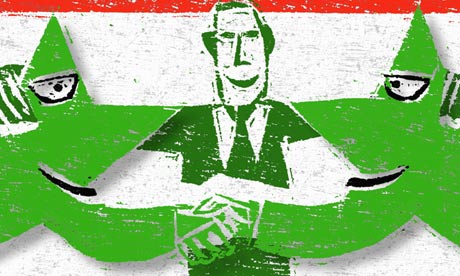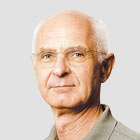Syria's story does not have to follow the Libyan script
The Arab League's dialogue with Bashar al-Assad has been dismissed by Syria's opposition – but it offers some hope

Illustration by Daniel Pudles
The news from Syria becomes ever more alarming. The two suicide car bombings that rocked Damascus on Friday brought a tactic of carnage not yet seen in the uprising against the government. Almost certainly the work of al-Qaida sympathisers, they may have been linked to blasts in Baghdad the previous day, targeting two Shia regimes that Sunni extremists want to shake or topple.
December had already seen the highest monthly death toll in the Syrian struggle for power, most of it at the hands of the government's security forces. Evidence of torture and executions of captives has been shown on Britain's Channel 4, apparently taken from mobile-phone footage which uniformed government troops took sickening pride in filming. In the north-western district of Idlib, close to the Turkish border, armed clashes are becoming more frequent; and the city of Homs, the stronghold of radical Sunni protesters, sees daily killing. Beyond the physical violence, there is the worsening economic crisis as international sanctions bite and hundreds of thousands of Syrians face a winter with dwindling supplies of oil for heating and cooking.
But amid the horror, a first glimmer of good news has appeared. The Syrian government has allowed Arab League observers into the country. They are deploying as part of a deal which offers the best, and perhaps last, chance of a political solution rather than a slide into all-out civil war.
The deal requires the government to release detainees and pull security forces out of cities where protests have been held. It also requires a serious dialogue with the opposition. Exile groups have attacked the deal as a ploy by the regime of Bashar al-Assad to gain time. They are also worried, with some justification, that the dispatch of monitors could mark a shift in the Arab League's previously hawkish position. By putting off further sanctions and resisting western pressure to take the issue to the UN security council, the Arab League may at last be taking up the role of a mediator.
Instead of welcoming the Arab League mission, the White House issued its toughest statement to date. It claimed that "every metric shows the situation is moving against Assad" and it is "only a matter of time before this regime comes to an end". The Syrian National Council, the umbrella for various exile groups that held its first congress in Tunisia a week ago, is keen to be recognised as the only representative of the Syrian people. Following the Libyan script, it is pressing for foreign intervention and the declaration of "safe havens" or "humanitarian corridors" that could be protected by a no-fly zone as a precursor to full-scale Nato support for their struggle.
The council does not like the Arab League's call for dialogue since it denies the opposition a simple victory. Getting the Syrian government to agree to it was not easy. Credit goes mainly to Russia's tireless foreign minister, Sergei Lavrov. While his bosses Putin and Medvedev are preoccupied with local turmoil at home over the recent Duma vote, unexpected street protests and the uncertainty of the upcoming presidential election, Lavrov has been working hard to forestall civil war in Syria. In a carefully calibrated signal, he let Russia abstain from, rather than oppose, a UN general assembly statement criticising the Syrian government's "disproportionate use of force". This was aimed at showing Assad that Russia will get tougher unless he offers honest dialogue with the opposition instead of the half-hearted measures he has proposed up to now.
In one sense Assad is fortunate. The opposition is multifaceted and divided. It includes eminent figures with secular and moderate views who want to protect Syria's complex multicultural society from a takeover by extremist Sunni or Salafi forces. Men likeMichel Kilo stand out. He spent three years in prison recently for calling for reform, but since the uprising started continues to warn publicly against sectarianism and armed revolt.
The best step for Assad would be to talk with Kilo and others from the internal opposition and the "local co-ordinating committees" who reject violence. As a dramatic sign of change for the vast number of Syrians who support neither the regime nor the uprising, the opposition should be given access to state television for public debates on how to find a peaceful transition to a system of pluralistic democracy. Assad should promptly repeal article 8 of the constitution, which gives his Ba'ath party the "leading role in society and state", publish the draft new constitution that independent consultants have been preparing, and allow political parties to operate freely.
Whether Assad can summon the determination to push for real reform in place of the dither and denial that have characterised his response to the protests so far is unclear. He is right when he says the state is entitled to use force against armed rebels, but wrong to portray all opposition to his regime as "terrorist".
It is also uncertain whether the US, Turkey and other states who have called on Assad to resign can change course now. The Arab League's plan imposes obligations on the opposition too. Rather than taking sides with the exiles, the west should support the call for dialogue before it becomes too late.
